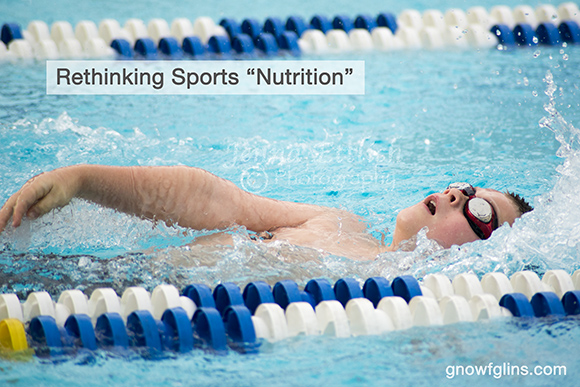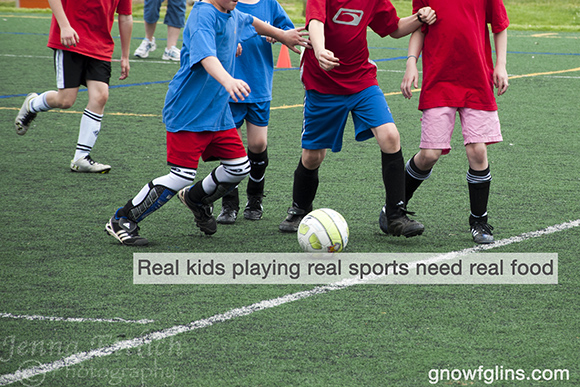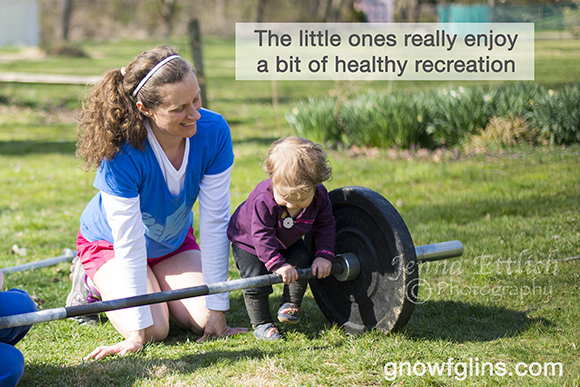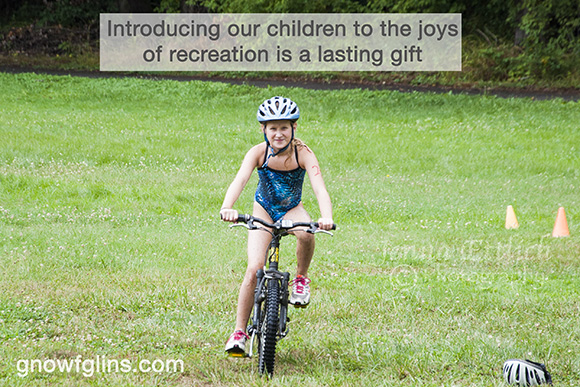
This is Part 1. Here’s Part 2 and here’s Part 3.
When I met my husband, we were triathletes. We trained together and ate together. We trained and ate . . . a lot. Both in frequency and amount. We did our best to eat and drink what we thought ‘healthy.’ But at that time, we weren’t thinking as critically as we do now about real food and its sources.
Shiny packaged bars, squishy packets of instant glucose and colorful bottles of electrolyte drinks complemented our mostly well-balanced, mostly real food diet. Or so we thought.
A lot has changed since then. Over 15 years, our diet has evolved into taking a truly whole food, traditional approach. And in terms of recreation, these days (years) you could more accurately call us “quintathletes.” The “quint,” of course, referring to our five children. They are each a sport in and of themselves. Some days certain ‘sports’ are more challenging than others!
Thus, with an athletic background, a love of recreation and now seven mouths to feed, I’ve done a lot of rethinking about sports nutrition. I’ve concluded that for the recreational athlete, it is possible to fuel, hydrate, refuel and rehydrate using real, unprocessed foods and drinks.

My Eyes Were Opened
I was a new sports parent a few years ago and something really startled me. Almost every time our children had practice, they were offered a highly-processed, sugar-laden snack for refueling. I allowed our children to enjoy it, encouraged them to be gracious, and let them be ‘dietarily normal’ alongside their teammates. But after a few days I realized: this wasn’t just a one-day treat. This was something we were going to face most days at most sports activities. My eyes (and mind) were opened.
My children’s eyes were equally opened when they noticed a couple kids ‘needing’ a whole quart of packaged sports drink after competing in one sprint-distance swim race. “Don’t we need that too, Mom?”
From my athletic past, I knew that for recreational athletes, electrolyte replacement drinks are really not needed until the 60 to 90 minute mark of continuous exercise (WebMD explains). How were we going to deal with this? I wondered whether we were the only parents with this concern . . .

I began asking myself: Why is it that we have come to know colorful bottles of electrolyte drinks as a must-have for any organized recreational event (no matter the length)? Why is it that snacks provided for teams are oftentimes very low on the nutrient-density scale? Why does the snack counter at a game or a meet often provide chips, candy, soda and donuts over, say, apples, bananas and trail mix?!
(My heart feels a deep sense of gratitude toward those who do bring healthier items for the team! Thank you!)
In general, all processed, prepackaged items are easy, portable, able to be preserved for a long time and well-advertised. In fact, they are marketed so well that we don’t question whether there’s another option — or question whether they’re healthy.
Sadly, processed foods like these — and those targeted specifically to sports and athletes — are consumed in high volumes. Advertisers tell us we ‘need’ these popular items in order to be well-nourished, successful athletes.
Here’s what I think: In the face of physical exertion, our bodies are in even greater need of nutrient-rich foods. And we all know that rich, real nutrients come from whole food.

What Exercise Can Teach Us
Sports and outdoor recreation are opportunities to teach healthy competition and exercise enjoyment. We learn so much through it all. It takes courage to brave a difficult hiking trail. It requires perseverance to complete a run. It causes humility to finish last in a swim race: dead last! It demands communication to pass a soccer ball. It bids diligent observation to learn to kayak. It necessitates patience to perform well with others when abilities diverge.
And, sports and recreation also reveal the blessing of real food and how it fits the bill for our dietary needs.
The good news is: Real food sports nutrition starts right in our own kitchens. All it takes is a bit of preparation, a little knowledge and some culinary fun to discover that real food can adequately fuel us.
Introducing our children to the joys of recreation, and the health benefits of real food, is a lasting gift.
I am not a Registered (Sports) Dietician, so I can make no claims about specific sports and their respective dietary needs, especially at a highly competitive level. I’m simply encouraging recreational athletes with a real food bent, to rethink ‘necessary products,’ their ingredients and the sources of those ingredients, to be used during sports and recreation.
In my next few posts, I will tackle (pun intended) this topic on a more practical level by providing easy sports drink recipes and snack bar recipes. Stay tuned!

Have you ever questioned the real food factor amidst organized sports and recreational fun? Do you find certain sports or outdoor activities to be more conducive to a real food lifestyle?
We only recommend products and services we wholeheartedly endorse. This post may contain special links through which we earn a small commission if you make a purchase (though your price is the same).


I am very excited for your next post! As a mother of very active children, I always knew that this processed stuff was bad for my kids but didn’t know what my alternatives were. Just a few weeks ago before my teenage son went to play 5 hours of straight high school basketball (which is insane to do to kids! Without a break or a snack) I made him take some of those gatorade gel chew things. I didn’t know what to give him on short notice that he could eat in a hurry to have the energy to keep performing without crashing.
mixed nuts and dried fruit would have been a much better alternative and some water. Sometimes things happen so fast that we don’t make good nutrition a priority. What better lesson in life is there to teach a child? Eat whole foods, fuel your body so you are healthy, then you can think clearly and your body will thank you with the ability to recover from strenuous activity.
A note about these large plastic sports bottles that the kids get at basketball camps and others…besides the chemicals they contain that leak into your drinks, they grow mold very quickly if not cleaned properly, and don’t forget to clean them right away or the odor will stay there forever and nothing will taste good when drank from them. What else can the kids use? Stainless steal is probably the best alternative. Any other ideas?
Hello Kiki, I’m glad to hear of your excitement about my next post. Hopefully it will prove helpful.
First of all, we do need to give ourselves some grace, just as God gives us. Sometimes, we aren’t as prepared as we wish we could’ve been, and we send our kids off with less than ideal nourishment. It’s okay. We’ll aim to do a better job next time!
For those times when we ARE able to prepare ahead, you’re right. Things like mixed nuts and dried fruit, or those taken together for a home made trail mix, would be nourishing and more sustaining than other processed choices. We often slice cheese, put it into snack-sized baggies, and then bring apples, all in a small slightly-insulated bag with an ice bag inside, so our kids can eat cheese and apples for a hearty snack. We’ve been known to make home made crackers and have a baggie of mixed nuts wherever we go too.
I agree with you on the plastic, disposable ‘sports bottles.’ I would personally look for BPA-free, plastic, reusable water bottles online, or even stainless steel ones, as you mention. We use both And as you point out, water is absolutely best for hydration. Electrolyte-based drinks are not necessary until quite a while after continuous exercise has begun.
Take care and God bless! Jenna
Thanks, Jenna!
I am really looking forward to your next installment. It is like the 1940’s Saturday movie serials. 😉
Leah, I’m glad you enjoyed. Yes, hopefully the next installment will inspire you. But also, I hope it’s a little more modern than a 1940’s movie, ha! Blessings, Jenna 🙂
Love this. Can’t wait to read more. Sports make supper meals very hard plus the whole snack thing. Some moms say they are so busy with kids sports they don’t have time to cook. It seems like we are so focused on having our kids be healthy and exercise that we neglect to take the time and energy on healthy food. If I have to bring a snack my kids and I have worked out an agreement with these foods. 100% juice boxes, pretzels, buddy fruits, lashing breakfast bars. ( that’s kashi!!!) One team mom said no snacks but we had a big team picnic at the end if the season. This has been our first year into swim. Wow!!!! Those swim meets and junk food!
Hello Heather, Thanks for reading and I’m glad this helped.
I’m curious – when you say, “sports make supper meals very hard” – do you mean all the time it takes to make a meal? Or, do you mean the amount of food that you have to make to feed hungry athletes makes meal-preps difficult?
I agree, perhaps we should all step back and decide what our priorities are. If we are SO set on having our kids exercise and be involved with so many (too many?) sports, are we neglecting the even more important job of instilling healthy eating habits? Are we proportionately spending too much time driving to and from, and participating in, those sports, than providing the nutritional support to maximize performance? Thanks for bringing that up.
It looks like you’ve figured out a good balance of ideas of snacks to bring if you have snack jobs.
And yes, ironically and unfortunately, we have found swim team (a very rigorous, very healthy, lifelong sport) to be a breeding ground for less-than-ideal sports nutrition habits. I’m sure other sports are equally bad (or worse), and I know some teams or families within swim teams are healthier than the average. So please don’t get me wrong. But it did amaze of what we saw that first year with regards to (lack of) healthy nutrition, for such a demanding sport. Sounds like you found the same. Perhaps it’s an issue of sports nutrition education pre-season by willing, volunteer, knowledgeable parents?
God bless! Jenna 🙂
Jenna, sports makes supper hard bc the practice or game starts at 6. Or earlier. I have already packed my supper and the siblings who were just tagging along could eat. However, that got old. For them and me. There were so many other kids they wanted to play with. Now I have supper all ready to eat right when we walk in the door. No easy thing. Someone pointed out to me that the number one way to keep your kids off drugs and keep their grades up and communication going is to eat supper as a family, but most sports take place during the supper hour. I’m not against sports, I actually
Dfont get into them, I never did any sports, but my four kids are loving sports.
Swim team. As you probably know, the meets are long with long periods of nothing for the kids. Many kids seem to be eating every kind of junk at the snack stand. We pack supper and fruit. Then they can get dessert at the snack stand. I was told winter swim you can only buy gatorade and soft pretzels and you can’t bring your own food! Well see about that!
Hello again, Heather: Yes, the conflict of typical sports-practice times and family dinners is probably true for many American families. I like hearing how you switched from bringing packed meals, to having food ready right when you walk in the door post-sports. It is no easy thing, but the benefit to your children is awesome. Great job on that. I rely on my crockpot a TON. Like you, I also have heard that prioritizing family dinners on a regular basis is a great way to keep family communication and relationships more open. Will be interested in hearing how winter swim goes! Thanks again for your feedback. Jenna
We have been a BIG (well, we have 5 kids and they are all long and tall, haha – but what I really mean is “very into”) homeschooling sports family since our oldest (now 21) was 5 and began soccer. Youth sports from soccer, basketball, baseball/softball, football to competitive high school sports (basketball, baseball, soccer, football, track & field). And with an age range of 12 years, you can well imagine the schedules we had to keep up with.
We have always been a real food family, primarily because I grew up that way (happens when you grow up overseas w/o the convenience of pre-prepared and pre-pkged) and grew to know and appreciate the benefits of real food.
Like many, tho, the sports schedules and snack options have often driven me crazy. And the necessity for creating/providing greater quantities of food as my sons (3) approached/approach their intense growing seasons combined with intense workouts for whatever sport season it happens to be can be overwhelming and cost-frightening!
I don’t have the perfect solution (you’d think I do after 16 yrs) and we will sometimes stray, but primarily we eat together from crock pot meals after practices/games. For games like football, for us spectators I have eat before we go or take to eat (just as well to bring sandwiches, etc as stop by subway or purchase from the hotdog/hamb choice@ the snack bar); and I bring meal for the child who was playing to eat after they are finished. Same goes for basketball – since we have often had kids on different teams, either by age or sex, they play at different times and we can be at the gym for 4-6 hrs. Now that I think about it, this year we only have 1 football player and he plays the varsity game, so I’ll have to make sure he has a good-food portion to eat between pre-game arrival and pre-game warm-ups (typically 3 hrs) and food available immediately after. Thankfully we only live about 10 min from the high school.
As far as snacks go, I’ve found it works best to either have them take snacks with or have something out for them to eat as soon as they get home from practice, else they are scrounging for whatever and creating dinner problems.
I try to encourage them as much as possible to stick to water – it gets tougher when they have their own $ to spend on things. And for away games, I’ll have them (or do for them) make food to take along. My eldest would make who bread-loaf worth of pbj and take carrots/other vegies on his road trips for baseball. His team mates began to anticipate his meals and we began to go through 10# of carrots weekly – lol. It was worth it to hear him relate one of his teammates confided to him that he “had some of the best meals and snacks ever.” And this from high-school kids. 😀
Hello Lynda,
Thanks for your contribution to this discussion. I enjoyed hearing from someone who’s been in the midst of multiple sports for multiple seasons! Sounds like your testimony of real food, even in the middle of a sports-heavy family lifestyle, has positively affected your children and even some of their teammates. Thanks for that example!
This fall, I plan to do three crockpot nights each week so as to account for late afternoon or early evening sports and/or music lessons. I’m glad to hear your crock pot has really helped you. Very encouraging.
God bless and thanks again for your insights. Jenna 🙂